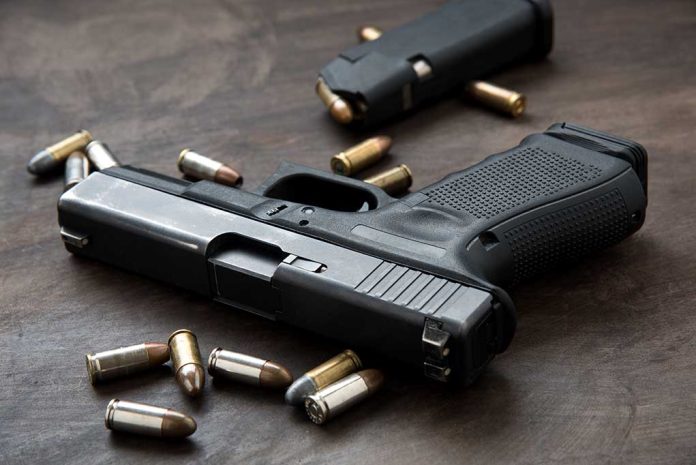
President-elect Donald Trump has reignited the debate on gun rights with his bold promise of national concealed carry reciprocity, aiming to strengthen Second Amendment protections across the United States.
At a Glance
- Trump pledges to sign concealed carry reciprocity legislation if elected.
- The initiative would allow concealed carry permits to be valid across all 50 states.
- Rep. Thomas Massie introduced HR9534, the National Constitutional Carry Act.
- The proposal faces opposition from gun control advocates and some law enforcement groups.
- Critics argue it could lower safety standards and increase gun violence, while supporters believe it enhances public safety by empowering responsible citizens to deter crime.
Trump’s Vision for National Concealed Carry
In a move that has energized Second Amendment supporters, President-elect Donald Trump has announced his intention to push for national concealed carry reciprocity. This initiative would allow individuals with a concealed carry permit from one state to legally carry their firearms in all 50 states, similar to how driver’s licenses are recognized nationwide.
Trump’s commitment to this policy has been consistent since his 2015 campaign. He argues that the right to self-defense should not be limited by state borders, emphasizing the need for uniformity in gun laws across the nation. This stance aligns with his broader agenda of reinforcing constitutional rights and addressing the concerns of gun owners.
Donald Trump announces that he'll sign national concealed carry reciprocity.
This means no matter which state you're in, if you've got your concealed carry license, each state will still have to honor it. pic.twitter.com/KwYcVlHPI9
— Daily Loud (@DailyLoud) November 11, 2024
Legislative Efforts and Challenges
Representative Thomas Massie has taken a leading role in this effort by introducing HR9534, the National Constitutional Carry Act. This bill advocates for permitless carry reciprocity across the United States, pushing the boundaries of current gun rights legislation.
“No one should have to beg the government to exercise a constitutionally protected right anywhere in the country,” says Rep. Thomas Massie.
However, the path to enacting such legislation is fraught with challenges. GovTrack.us gives the bill a mere 1% chance of passing in the current political climate. The proposal faces strong opposition from gun control advocates and some law enforcement groups who argue that it could lower safety standards and potentially increase gun violence. Supporters maintain, however, that it will protect Second Amendment rights and empower responsible citizens to safeguard themselves and their communities.
Debate Over Safety and States’ Rights
Critics of the national concealed carry reciprocity initiative argue that it could undermine state-specific gun laws and potentially compromise public safety. Organizations like Everytown for Gun Safety have expressed concerns about the implications of allowing out-of-state visitors to carry concealed weapons without meeting local requirements or background checks.
Supporters of the initiative, however, argue that it simply extends the constitutional right to bear arms across state lines, much like other fundamental rights. They contend that law-abiding citizens should not be penalized for crossing state borders and that the proposal would enhance personal safety.
Potential Impact on Gun Violence
The debate over national concealed carry reciprocity comes at a time when gun violence statistics have shown some improvement. According to some sources, gun violence has been declining for two consecutive years. However, critics of the proposal warn that loosening concealed carry requirements could reverse this positive trend.
Studies cited by opponents suggest that weakening concealed carry requirements may lead to increases in violent crime, firearm robberies, gun thefts, workplace homicides, and mass shootings. These concerns are balanced against the arguments of Second Amendment advocates who believe that more armed citizens could deter crime and enhance public safety.
Looking Ahead
As the debate continues, the fate of national concealed carry reciprocity remains uncertain. While Trump’s support gives the initiative significant political momentum, it will likely face intense scrutiny and opposition in Congress. The outcome of this proposal could have far-reaching implications for gun rights, public safety, and the balance between federal and state authority in regulating firearms.
“MY ADMINISTRATION WILL PROTECT THE RIGHT OF SELF-DEFENSE WHEREVER IT IS UNDER SIEGE. I WILL SIGN CONCEALED CARRY RECIPROCITY — YOUR SECOND AMENDMENT DOES NOT END AT THE STATE LINE,” states President-elect Trump.
As the nation grapples with these complex issues, the debate over national concealed carry reciprocity is likely to remain at the forefront of discussions on gun rights and public safety for the foreseeable future.








